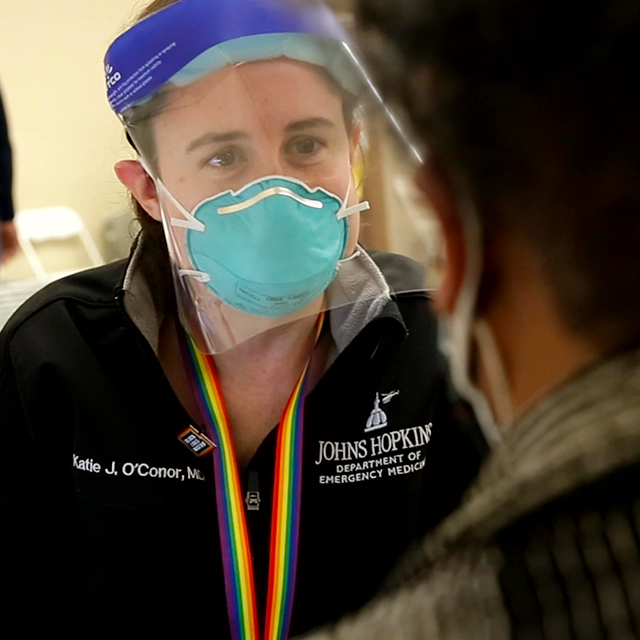Imam Earl El-Amin was not sure if he was following the correct COVID-19 procedures when he reopened his mosque a couple of months ago. Johns Hopkins pulmonary and critical care physician Panagis Galiatsatos, M.D., M.H.S., and Selwyn Ray, director of community relations for the Johns Hopkins Health System, toured the empty halls of the Muslim Community Cultural Center of Baltimore and answered El-Amin’s health and safety questions: Should the group continue to practice physical distancing? How is contact tracing performed? Is the mosque allowed to ask people if they are vaccinated?
After streaming religious services online for a year, Baltimore faith leaders want to know what COVID-19 protocols to follow during in-person services. This inspired a collaboration among houses of worship, Baltimore City and Johns Hopkins to help advise religious leaders about how to safely return to on-site worship. The medical-religious partnership began a pilot program phase July 21 at the Muslim Community Cultural Center and at Israel Baptist Church, which is just northeast of The Johns Hopkins Hospital.
El-Amin and his team were most concerned about how often they need to sanitize their facility. Galiatsatos and El-Amin conducted a walk-through of the center, and the doctor offered recommendations and up-to-date guidance from the Centers for Disease Control and Prevention.
Galiatsatos explained that the coronavirus that causes COVID-19 spreads when people are near one another, and someone breathes the virus out and another person breathes it in. Church leaders then felt confident welcoming people back to the cultural center for outdoor services and occasional indoor events.
“The best way to beat COVID is to not get COVID,” Galiatsatos says. “The best way to not get COVID is understanding how it spreads, how to contain it and how to ultimately put an end to the pandemic.”
During a virtual press conference on April 26, Baltimore Mayor Brandon Scott and Johns Hopkins Medicine officials announced the collaborative city, faith groups and Johns Hopkins effort.
“We are teaming up with our faith-based institutions to make sure they can effectively and safely serve the citizens of Baltimore,” Scott wrote in an email about the partnership.
The initiative rolled out in two phases. The first phase, a virtual education session on May 25, was the Scott administration’s most watched online seminar up to that date, according to Nondie Hemphill, Johns Hopkins associate director of local government and community affairs. Twenty faith organizations participated in the second phase, a pilot program of virtual and in-person walk-through sessions.
“People are at different phases and different comfort levels of reopening,” Hemphill says. “We’re doing our best to provide personalized guidance to these interested faith institutions.”
During a walk-through at the historic Israel Baptist Church, Katie O’Conor, a Johns Hopkins Medicine expert, and Chrystal Green, M.Ed., assistant director of Johns Hopkins East Baltimore community affairs, toured the site with the church health team.
Israel Baptist Church decided it would only host 50% capacity in its sanctuary space, which normally holds more than 1,000 people. However, the pastor and church health team leaders still worried about spread of the coronavirus.
“I would say the key thing is continuing to reinforce mask-wearing and other safety measures,” O’Conor says. “It’s a team effort.”
The church now provides hand sanitizer stations and extra masks. O’Conor and the church’s health team discussed how ushers and health monitors could gently remind congregants to wear masks, distance, sanitize and perform other safety measures.
Like many churches, even as it expands in-person services, Israel Baptist will continue to offer services online.
Galiatsatos wants to make sure that the medical, religious and city partnership remains sustainable and that Johns Hopkins stays informed about how the community is doing in its fight against the virus.
“Doctors and nurses are not the only front line of defense,” Galiatsatos says. “‘Front line’ should imply people who can prevent disease. From my standpoint, these congregants, these leaders, faith-based groups and, honestly, every other human, is a part of the ‘front line’ where you can spread information and help people stay safe.”
This news story was researched and written by Naomi Washington, Johns Hopkins Medicine Elaine K. Freeman intern.


